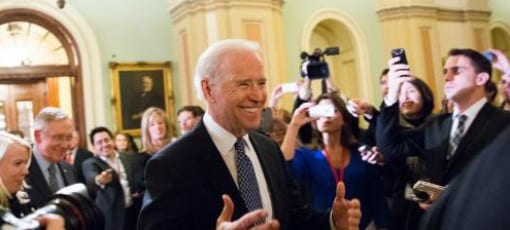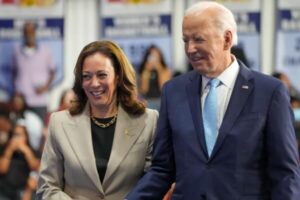Fiscal Cliff Breached but Senate Deal Done; House Action Next
Congress allowed America to stumble over the fiscal cliff Tuesday morning but left itself enough rope to pull the country out of trouble, perhaps before lunch.
Senate leaders of both parties agreed late Monday night to a deal to avoid the fiscal cliff, but it was 2 a.m. before the Senate voted 89-8 to pass the agreement – one that still must be approved by the House of Representatives.
However, because Tuesday is a federal holiday, there is time for Congress to approve the bill and backdate it so taxpayers can avoid the punishing tax hikes and spending cuts that were supposed to roll into place today.
Taxpayers are now waiting for House to approve – or reject – a deal brokered by Vice President Joe Biden that would extend tax cuts for households earning under $450,000 and individual earning less than $400,000.
Senate Democratic Majority Leader Harry Reid and his Republican counterpart, Mitch McConnell, got members to agree on a bill that protects middle-class taxpayers, while also delaying mandatory spending cuts in defense and domestic programs for another two months.
There was not enough time to get the measure voted on by either the Senate or the House of Representatives, but President Obama held a news conference Monday afternoon, surrounded by families, that made it sound like a deal was imminent.
‘Issues Left to Resolve’
“Preventing that tax hike has been my top priority, because the last thing folks like the folks up here on this stage can afford right now is to pay an extra $2,000 in taxes next year,” Obama said. “Middle-class families can’t afford it. Businesses can’t afford it. Our economy can’t afford it.
“It appears that an agreement to prevent this New Year’s tax hike is within sight, but it’s not done. There are still issues left to resolve, but we’re hopeful that Congress can get it done. But it’s not done.”
Tax relief and a slowdown on spending cuts are the two major components of the agreement that also includes:
- A promise for a permanent fix for the Alternative Minimum Tax;
- Extending benefits to the unemployed;
- Increasing capital gains and dividend tax rates from 15 percent to 20 percent;
- Exempting the first $5 million from estate taxes, then taxing them at 40 percent, instead of the current rate of 35 percent; and
- Increasing reimbursement levels for doctors treating Medicare patients.
However, the Medicare hike will be leveled off by cuts to other health programs.
The accord was voted down by a handful of the most conservative Republicans and the most liberal Democrats.
In the end, three Democratic Senators said no: Tom Harkin of Iowa, Tom Carper of Delaware and Michael Bennet of Colorado.
Five Republicans were opposed, including Florida’s Marco Rubio, a Tea Party favorite who is widely considered a presidential candidate for 2016. Others were Mike Lee of Utah, Rand Paul of Kentucky, Richard Shelby of Alabama and Charles Grassley of Iowa.
Agreement Goes to the House
Republican House Speaker John Boehner promised to bring the bill to a vote, possibly as early as today, but he guaranteed nothing until the compromise was vetted more fully by the House.
If it passes the House, it goes to President Obama, who already has said he will sign it as soon it reaches his desk. Getting it there has not been easy.
Senate Republicans fought among themselves Monday on whether to accept tax hikes for anyone and insisting that the spending cuts must go into effect immediately. Ultimately, they gave in on the tax increases after Obama raised his threshold from $250,000 in personal wages to $400,000.
Democrats, responding to recent polls that say the public was ready to blame the Republicans if no deal was reached, dug in on the issue of taxing the wealthiest individuals, extending unemployment benefits and postponing the mandatory spending cuts.
Biden, Reid and McConnell Haggled
The two sides called in Biden to arbitrate, and he worked furiously with McConnell and Democrat Harry Reid to get the deal in place, albeit two hours after breaching the deadline set by Congress in August 2011. That year-old deal stemmed from when neither side could agree on tax hikes and spending cuts that would reduce the federal deficit, which now stands at $16 million.
The 2012 election cycle then began in earnest, and there was little progress until after Obama was re-elected on Nov. 6. The next day, Boehner for the first time said he would be willing to consider some tax increases.
As one early deal faltered, Boehner put forth his “Plan B” approach. A planned vote on his compromise was cancelled at the last minute when Boehner could not sell it to members of his party.
The bickering continued Monday, even as the deadline approached for $110 billion in spending cuts and $500 billion in tax hikes that both parties agree would send the U.S. economy into another recession. A deal was finally reached around 9 p.m.
By then, the New York Stock Exchange had closed at 13,104.14, up more than 166 points on the day – the only up day in the closing week of the year.
Senate Democrats, many of whom were opposed to the spending cuts, sided with Biden on the theory that something is better than nothing.
“There are many, many reasons people don’t like the proposal, but there’s virtual, very close to unanimity that it’s better than going over the cliff,” Sen. Charles E. Schumer (D-N.Y.) told The Washington Post. “The disagreements on this provision . . . are large and wide, but the number of people who believe that we should go over the cliff rather than vote for this is very small.”
Sources:
- Caldwell, L. (2012, Dec. 31) It’s official: Deal reached on “fiscal cliff”. CBS news. Retrieved from: http://www.cbsnews.com/8301-250_162-57561465/its-official-deal-reached-on-fiscal-cliff/
- Dixon, K. and Mason, J. (2012, Dec. 31) Senate to vote on “fiscal cliff” as deadline approaches. Reuters.com. Retrieved from: http://www.reuters.com/article/2013/01/01/us-usa-fiscal-idUSBRE8A80WV20130101
- O’Keefe, E. (2012, Dec. 31) Senate Dems expect ‘strong vote’. The Washington Post. Retrieved from: http://www.washingtonpost.com/blogs/post-politics/wp/2012/12/31/senate-dems-expect-strong-vote/


















